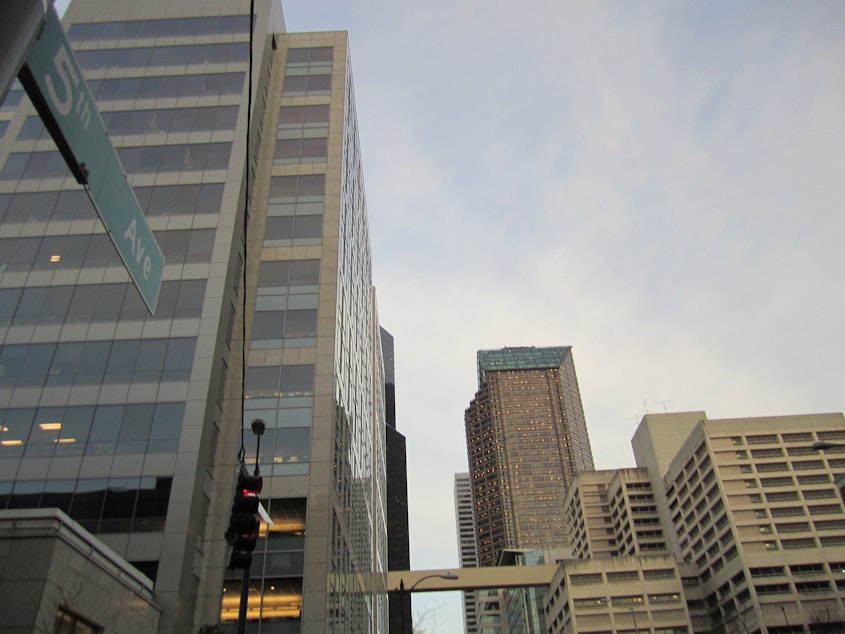King County Exec proposes phasing out downtown Seattle jail

King County Executive Dow Constantine is proposing to phase out use of the county's jail in downtown Seattle, which currently houses inmates along with the county’s Regional Justice Center in Kent.
The proposal is part of Constantine's "state of the county" address scheduled for this Thursday. He's also announced the phase-out of youth detention in new Children and Family Justice Center by 2025.
The county's adult jail population has been reduced during the pandemic to the current level of 1,332 people. They are split with 700 in Kent and 632 in Seattle.
In a July 21 memo, John Diaz, director of the county’s Department of Adult and Juvenile Detention, told his employees, “The Executive’s proposal calls for a phased closing of the Seattle jail. This would take place once the Covid-19 pandemic has been brought under control.
The building, finished in 1986, was among the last of its kind. It features a design that’s now considered obsolete. As many of you know, it’s expensive to operate and doesn’t serve our security, healthcare, or efficiency needs.”
The memo continues, “To decrease our reliance on secure detention, the Executive intends to support programs for prevention, diversion, rehabilitation, and harm reduction ... We hope to have more details on the plans for KCCF after the Executive prepares the budget later this year.”
The announcement that the jail will be phased out took corrections employees, courts and prosecutors by surprise. In a video conference call on Wednesday, Constantine said he doesn’t have any time frame to close the jail. He said the county needs time to find alternative housing for inmates with specific medical and mental health needs.
“There are many, many specialized units within that facility beyond the general population,” he said “So we’re going to have to have a very thoughtful conversation about how we accommodate each of those needs, where they’re accommodated, what kinds of new facilities are being constructed around the world that are more therapeutic.”
He said the existing facility is decrepit and expensive to operate. It was built on a restrictive model that one employee characterized as “indirect supervision” or “inmates behind glass,” as opposed to the newer facility in Kent where inmates have more freedom of movement and can interact directly with staff.
Constantine said he’s envisioning a massive renewal project where the Seattle jail now stands. “We must reimagine King County’s downtown Seattle campus, the entire campus, in light of the realities of today," he said. "And the old jail must at some point come down.”
The spokesperson for the King County Prosecutor's Office, Casey McNerthney, said they only learned of the planned phase-out of the jail and youth detention beds when they saw the memo from Diaz on Tuesday.
McNerthney said, "An important note from Executive Constantine’s comments to reporters this afternoon is that this effort will be done in good faith from a collection of voices in our community, and no one voice defines what happens over the next five years. We are looking forward to those discussions."
He said the prosecutor's office will continue to go to court to address felony crimes and violent individuals, but he added, "Our office also is taking on the complex and difficult issue of systemic racism within the criminal justice system."
The No New Youth Jail Coalition called the county's announcements this week an important victory. But members are calling for the youth detention beds to be phased out sooner than Constantine’s five-year timeframe. And they say they would oppose increased reliance on home monitoring as an alternative.
The Coalition also laments the money wasted to build the new youth detention center, which just opened earlier this year as part of the county’s $232m Children and Family Justice Center:
“The recent uprising against anti-Black racism and racist systems criminalization, however, have pushed the County to finally concede that its punishment systems are unjust and it is time to shutter [these] horrible facilities,” they wrote in a blog post. “If only they had listened to the outpouring of community opposition to this wasteful project earlier!”
Dominique Davis is the founder of Community Passageways which supports local youth and young adults “at every stage of the criminal legal process.” He told KUOW he’s excited about the direction King County is taking with these announcements.
“The Community has been fighting to stop this building from being built for years and it fell on deaf ears,” he wrote. “But in the midst of a pandemic, recession, and an awakening that racism exists in the criminal injustice system we are seeing changes finally happening!!!”
Davis said the next step should be to direct jail funding to community programs instead. He said, “It’s time to address the institutions of racism and how they have perpetuated self-hate in our communities of color! So YES I am happy about this announcement but it is one small step in making up for hundreds of years of brutality of Black people through the system.”




